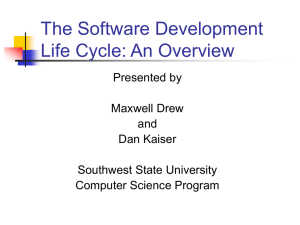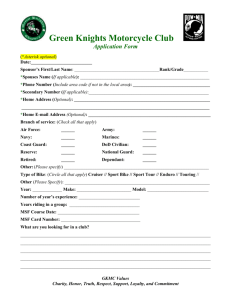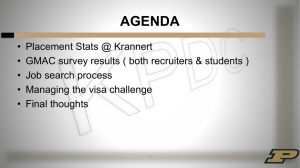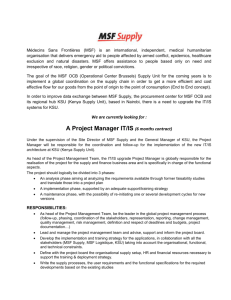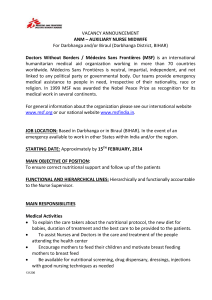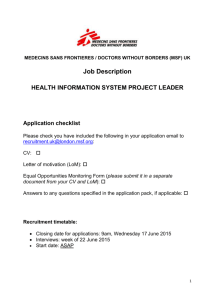Doctors Without Borders/Medecins Sans Frontiers (MSF)
advertisement
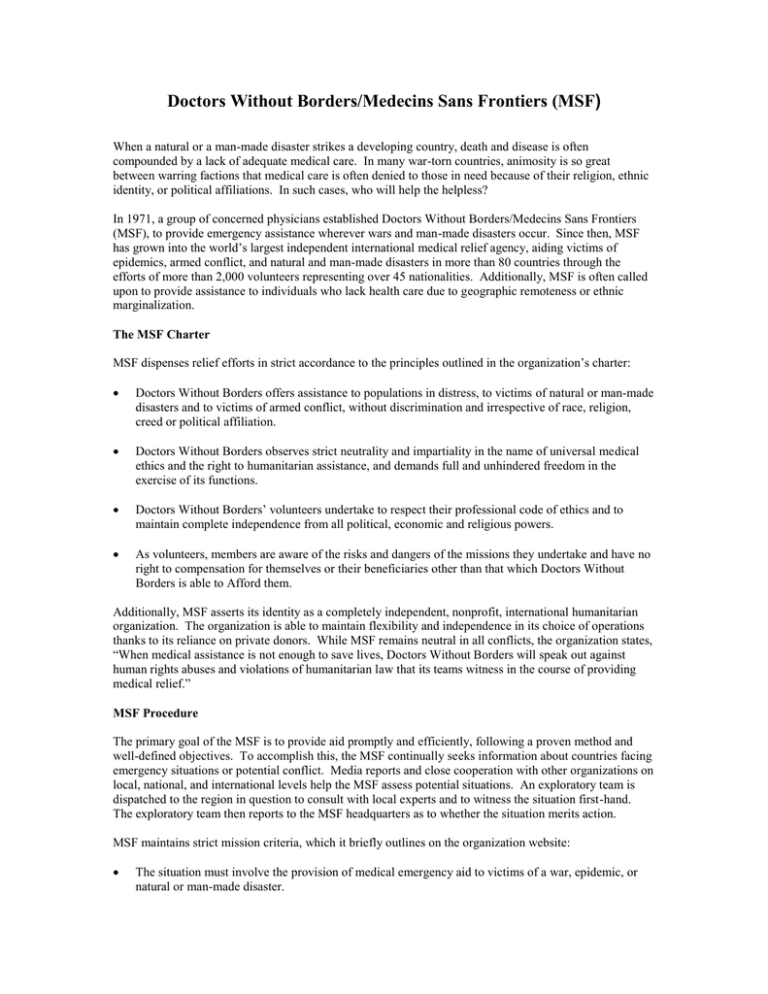
Doctors Without Borders/Medecins Sans Frontiers (MSF) When a natural or a man-made disaster strikes a developing country, death and disease is often compounded by a lack of adequate medical care. In many war-torn countries, animosity is so great between warring factions that medical care is often denied to those in need because of their religion, ethnic identity, or political affiliations. In such cases, who will help the helpless? In 1971, a group of concerned physicians established Doctors Without Borders/Medecins Sans Frontiers (MSF), to provide emergency assistance wherever wars and man-made disasters occur. Since then, MSF has grown into the world’s largest independent international medical relief agency, aiding victims of epidemics, armed conflict, and natural and man-made disasters in more than 80 countries through the efforts of more than 2,000 volunteers representing over 45 nationalities. Additionally, MSF is often called upon to provide assistance to individuals who lack health care due to geographic remoteness or ethnic marginalization. The MSF Charter MSF dispenses relief efforts in strict accordance to the principles outlined in the organization’s charter: Doctors Without Borders offers assistance to populations in distress, to victims of natural or man-made disasters and to victims of armed conflict, without discrimination and irrespective of race, religion, creed or political affiliation. Doctors Without Borders observes strict neutrality and impartiality in the name of universal medical ethics and the right to humanitarian assistance, and demands full and unhindered freedom in the exercise of its functions. Doctors Without Borders’ volunteers undertake to respect their professional code of ethics and to maintain complete independence from all political, economic and religious powers. As volunteers, members are aware of the risks and dangers of the missions they undertake and have no right to compensation for themselves or their beneficiaries other than that which Doctors Without Borders is able to Afford them. Additionally, MSF asserts its identity as a completely independent, nonprofit, international humanitarian organization. The organization is able to maintain flexibility and independence in its choice of operations thanks to its reliance on private donors. While MSF remains neutral in all conflicts, the organization states, “When medical assistance is not enough to save lives, Doctors Without Borders will speak out against human rights abuses and violations of humanitarian law that its teams witness in the course of providing medical relief.” MSF Procedure The primary goal of the MSF is to provide aid promptly and efficiently, following a proven method and well-defined objectives. To accomplish this, the MSF continually seeks information about countries facing emergency situations or potential conflict. Media reports and close cooperation with other organizations on local, national, and international levels help the MSF assess potential situations. An exploratory team is dispatched to the region in question to consult with local experts and to witness the situation first-hand. The exploratory team then reports to the MSF headquarters as to whether the situation merits action. MSF maintains strict mission criteria, which it briefly outlines on the organization website: The situation must involve the provision of medical emergency aid to victims of a war, epidemic, or natural or man-made disaster. The aid offered by local medical services and other organizations in the area must be deemed inadequate in relation to existing needs. The area must be accessible. The safety of the staff must be guaranteed. The organization must have enough qualified personnel at its disposal to carry out the work. Preferably, there are local organizations or authorities with which to collaborate. If the MSF decides that it can be of assistance in a situation, the organization can be on the scene of the disaster within 24 hours with planeloads of supplies. This is due in large part to the maintenance of four logistical centers in Europe and East Africa, and stocks of emergency equipment in Central America and East Asia. MSF has even developed pre-packaged disaster kits complete with portable surgical theatres and obstetrics kits that can be ready for transport to the disaster site within hours. Quick and effective response is what MSF does best, and when the disaster is stabilized, MSF leaves to make room for longterm relief organizations and free its own personnel for response to new disasters. As a side benefit to its twenty-six years of experience in the field of humanitarian relief, MSF has developed handbooks covering many aspects of relief work that have been translated into several languages for the benefit of other relief organizations. The organization also publishes a book series “Populations in Danger”, an annual report on the world’s most acute humanitarian crises, in order to increase general public awareness. MSF Assistance to Landmine Survivors With its highly developed disaster response procedures, it should come as no surprise that MSF is well suited to respond to victims of landmines. The organization voices its opinion in no uncertain terms, “Doctors Without Borders wished to add its voice, in the strongest way possible to the international movement aimed at banning landmines.” To this end, MSF has developed a detailed report on the problem of landmines in Afghanistan, “Living in a Minefield.” In the report, MSF calls for an international ban to help prevent the horrors its staff has witnessed in Afghanistan from ever happening elsewhere. MSF does its part by ensuring that all landmine victims treated by its staff in Kabul, Afghanistan are systematically registered. Between mid-March 1995 and the end of 1996, MSF treated 108 mine victims, and reports that one in three were children. In addition, MSF has analyzed the types of injures most commonly received from landmines, and makes recommendations for emergency treatment and follow-up treatments that the organization would like to see implemented as standards. The Continuing Role of MSF MSF plays a vital role in the humanitarian relief cycle, providing rapid response to populations in need, rushing emergency supplies and trained medical personnel to the scene of many of the world’s worst humanitarian disasters. Once on the scene, MSF takes life-saving action, providing much needed services such as massive vaccination campaigns, water and sanitation, feeding, and patient care. Perhaps most importantly, MSF gives stricken populations the foundations for long-term recovery, stabilizing the situation and in many cases providing training and support for local medical personnel to carry on relief activities independently once the most acute need has passed. And MSF does not forget. With the publication of reports such as “Living in a Minefield,” and Populations in Danger, MSF provides the most vital, life saving care any medical personnel can offer– prevention. Here’s to hoping that raised awareness will prevent some of the world’s atrocities from ever happening again. Medecins Sans Frontiers (MSF) Doctors Without Borders USA, Inc. 6 East Street, 8th Floor New York, NY 10016 USA E-mail: doctors@newyork.msf.org Website: http://www.dwb.org/index.htm

